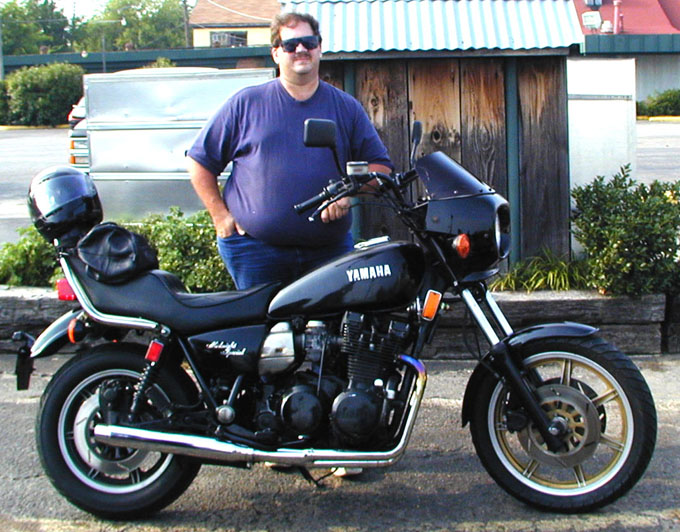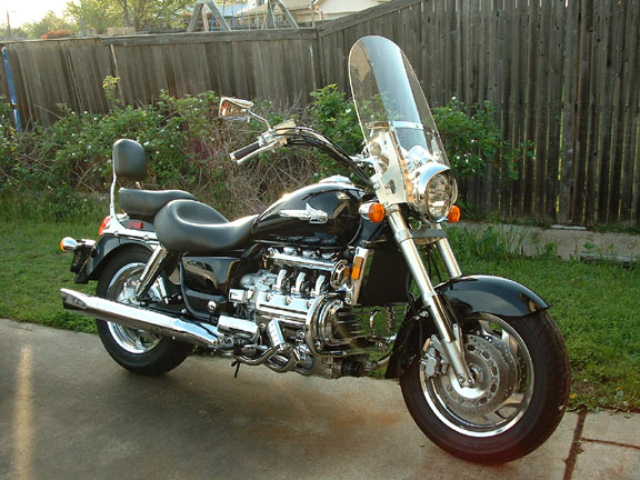My bike runs good on regular gas (87 octane) so that's what I've always used. Last fill up I found a cheap station so I got mid grade (89 octane) just for the heck of it. On a ride last night my bike was running really good, so now I'm curious what other XSives use.
octane
Collapse
X
-
octane
76regular - 87 octane35.53%27mid grade - 89 octane18.42%14premium - 92 octane46.05%35Robert
79 SFTags: None -
I use regular, but lately I have read some things here and other moto forums where they use the higher octane and get better performance. I will be doing some comparos during the TeXSive Rally this month.[b][size=4][font=times][color=#BD0062]Wayne[/color][/font][/size][/b]
[b][size=4][font=times][color=#095de5]TeXSive forever[/color][/font][/size][/b]
The best alarm clock is sunshine on chrome. -
In my understanding octane is added to fuel to reduce its flashpoint. In higher compression engines a fuel with lower octane content will ignite prior to the time that the spark plug would normally ignite it. Similar to the way a diesel engine works. This is why you get the "knocking" sound with some engines when running lower octane fuel.
Octane does not necessarily make the fuel burn hotter or more efficiently. It keeps the fuel from pre-igniting. Aircraft engines which are high compression (11.5:1.0 to 12.5:1.0) use fuels with octane levels around 94 - 96. Our skoots engines are not high compression engines (around 9.5:1.0?). They should run fine on the 87-89 octane range.
It is a mis-conception that octane rating is a designation of fuel quality. More is not necessarily better. Just more expensive.
The octane rating is really a measure of a fuel's antiknock performance. Someone out there devised a scale from 0-100. The value 0 was assigned to n-heptane (a very knock prone fuel) and a value of 100 was assigned to iso-heptane. 87 octane fuel has the anti knock performance equal to that of 87 percent iso-octane and 13 percent n-heptane (by volume). They test to determine the octane number using a variable compression ratio engine. They find the compression ratio in which a standard knock intensity is found... and they look on some chart and magically they somehow get a octane rating. With high octane gas you can run high compression ratios and get improved efficiency and higher power output.
I heard a chemistry professor say, "0" was straight-chain octane (even more knock-prone than n-heptane), and that 100 was 2,2,4-trimethylpentane (aka iso-octane)". I always have to smile
when somebody talks about "getting fuel with more octane in it" when they really want LESS octane, and more iso-octane. If "0" really refers to n-heptane.
Hope this helps.
Ride safe!Bob UdyComment
-
My engine does not knock on 87 octane gas, but it did seem to run better than usual when I went for a ride several days after putting in 89 octane. (I had forgotten about the gas so I was not looking for an improvement). Don't know what part if any the gas played in that, just curious as to what others used.Robert
79 SFComment
-
The higher the octane the less volitile the fuel, so higher octane actually burns slower. This will cause deposits to form in your engine in extreme cases. Higher Octane will only improve performance if you engine is knocking (pre-detonation) or the timing has been set back to run on lower octane fuel. (either by hand or with the anti-knock sensor) Some fuel companies may do other tweaks to higher octane fuel, but it is all a marketing ploy.
Our Dodge Neon actually said to only run 87 octane as higher octane will cause build up in combustion chambers due to slower burning.
So in summary if you are not exeriencing knock with 87 octane than switching to 92 will not increase performance, unless the timing can be advanced to take advantage of this. So just run 89 in eveything like I do and.......forgetdaboutit.Gary Granger
Remember, we are the caretakers of mechanical art.
2013 Suzuki DR650SE, 2009 Kawasaki Concours 1400, 2003 Aprilia RSV Mille TuonoComment
-
I get demonstratably better milage on the 87 octane . . . the higher grades I run sometimes in the extreme heat, but only if I have had any pinging.Comment
-
Higher octane fuel should burn just as good as the low octane stuff. During the burning process the pressures get so high that there is no difference what the number was when starting. There might be some effect on the burning speed, don't remember for sure. This would be reason for ignition adjustment.
Only meaning of the number is to indicate the pressure resistance factor so that the engine doesn't pre-ignite. Increase of power should not happen. By modifying the engine it is possible to increase the compression which would then again require the higher octane rated fuel.
I have however noted that using different octane fuel seem to make some difference in engine operation. It's not more power or torque it's just different...
Don't know what's going on but it's just there. Maybe it has something to do with the noise of the burning process?
I have actually seen the variable ratio engine used in detecting the octane (equivalent) number of fuel. We had a oil company guy show us the operation. There was reference fuel used with a known behaviour and the fuel in study was compared to that. It was possible to change the n-heptane / iso-heptane ratio (which tells the octane number) and determine the RON number of fuel (Research Octane Number). From that the MON (Meter or Motor ON) was calculated, I think they just added 5 to the RON number but it must have been more complex.
Anyway here in Finland we have three alternatives on fuel. 95E (unleaded reguler) and 98E (same stuff different octane) and 99 (lead replaced with some other valve protective additive). I have been running on all these but mostly use the 95 variant since it's the most cheapest.
-Marko---
Marko
'81 SHComment
-
octane-schmoctane
Sorry 'bout the subject title, couldn't think of anything else. I have used all three grades of gasoline in my bike & really have not noticed much, if any, difference. So I just burn the "regular" unleaded, but still listen for any "unsettling" noises from the ol' engine. Looks to me like the "Octane Controversy" is on an equal par with the "Oil Controversy" .
I'm the Person my Parents Warned me about.
.
I'm the Person my Parents Warned me about.Comment
-
There's that word again.Originally posted by Wayne
I use regular, but lately I have read some things here and other moto forums where they use the higher octane and get better performance.
Do you mean faster acceleration? Higher top end speed? Better around town fuel economy? Better highway fuel economy? Better racing-speed fuel economy? Better zero to sixty times? Smoother (lower) idle? Greater towing capacity? Better throttle response? Smoother shifting? Increased range per tank?
What exactly IS performance?Comment
-
Performance definition
I WANT IT ALL!!!
per·for·mance - Pronunciation Key (per-fôrm-ens) n.What exactly IS performance?
The way in which someone or something functions.[b][size=4][font=times][color=#BD0062]Wayne[/color][/font][/size][/b]
[b][size=4][font=times][color=#095de5]TeXSive forever[/color][/font][/size][/b]
The best alarm clock is sunshine on chrome.Comment
-
I didn't mean that my bike had more power, it just seemed somewhat better (smoother?). Kinda like how my engine runs better/happier when it is 70 degrees than when it is 90 degrees outside.Robert
79 SFComment
-
Well . . . I stuck High Octane in this:What exactly IS performance?

And it turned into this:


So sorry . . . could not resist!Comment
-
Well,
I run the Higher Octane, but that's partly because I have the big bore kit, and after a recent comp. test, it has 12.25:1 ratio hence the desire and need for the pricier stuff. If your engine knocks, you should use a higher octane, because the knocking is causing damage, the piston getting slapped against the cylinder wall due to pre-detonation occuring in another place other than from the area of the spark plug, and exerts forces in other vectors than from directly atop the piston where it should be coming from. A few pennies more per gallon is much cheaper than a top end rebuild!!T. C. Gresham
81SH "Godzilla" . . .1179cc super-rat.
79SF "The Teacher" . . .basket case!
History shows again and again,
How nature points out the folly of men!Comment
-
Octane
Robert,
I own a '78 XS11 Standard with 85k on it. I've used all three grades in it. My "seat of the pants" is that the bike is always more responsive when I use the 91 octane. Of course, I still have to look into why I only get 20mpg with any gas I use. If anyone has any suggestions, fire away.
Thanks,
AustinOriginally posted by Robert Haller
My engine does not knock on 87 octane gas, but it did seem to run better than usual when I went for a ride several days after putting in 89 octane. (I had forgotten about the gas so I was not looking for an improvement). Don't know what part if any the gas played in that, just curious as to what others used.Don QuixoteComment
Comment